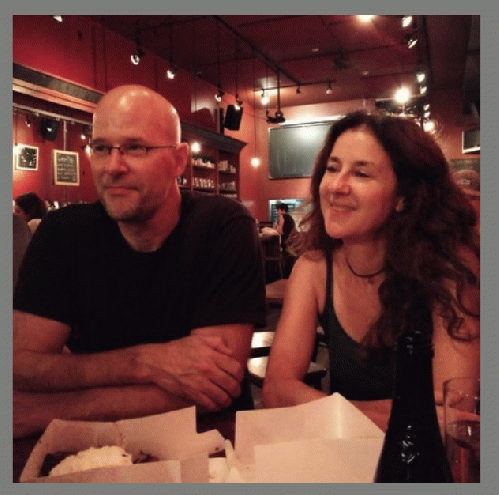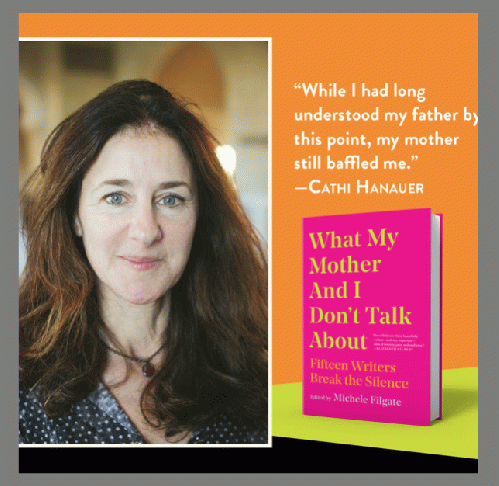CH: I've published three novels and essays in many anthologies (most recently Michele Filgate's Things My Mother and I Don't Talk About), and I've written for tons of magazines: Elle, O, The New York Times Book Review.... I wrote the books column for both Mademoiselle and Glamour and the advice column for Seventeen and, much later, an online site for midlife women called NextTribe (my columns age as I do!). You can find links to a bunch of my writing at my website, cathihanauer.com, or watch my TED Talk, "How I Became the Bitch in the House."
JB: What a catchy title for your TED Talk! Lovely. I was just going to ask you about the mix. How do you organize your day to shift from one thing to another? What works best? Does it ever get confusing to be wearing numerous hats?
CH: Since you complimented the title, I'll come clean. The real title is "How To Avoid Becoming the B*tch in the House (and the Bastard on the Couch)," but that's a mouthful. A millennial friend coined the shorter one after I'd already done the talk, but once it's posted they don't let you change the title, so I just use the shorter one now when describing it, hoping no one will notice. As for many hats, I try my best to wear only one at a time; when I'm writing a novel, and particularly toward the end of a draft, I really try to lock everything else out of my life--even the news (okay, especially the news). I try to finish my business in the morning or at night, and in between to just think about the book, the story, the characters--easier said than done when you have a family, a house, a dog, a life (and that's why writers colonies and retreats exist)--but absent that, you do the best you can.
But I try not to take on assignments, I try not to teach...because writing a novel requires a certain sort of immersion that reality pulls you out of. You need concentrated swaths of time to think and obsess, and even when you're not actively sitting and working, you still tend to have ideas for the novel evolving in your head. When I'm not writing a novel, I want (and need) to have other work--an essay to write for an anthology (used to be magazines, too), a class I'm teaching, a student or two I'm working with. But while writing a novel I can't even really stand it when someone asks me to read something, because I don't want to get distracted from what I'm writing. I heard someone say recently that there's actually no such thing as multitasking; doing more than one thing at a time is simply your brain shifting from one task to another to another.
So, you can see why that's not conducive to good writing, which is really about deep immersion, deep obsession--not surface flitting about. And it gets harder and harder, really, to do that immersion, in this age of distraction--the constant stream of social media and banners and ads on our computers and (ever present) cell phones, things constantly dinging and binging and pinging. Texting is a particularly egregious example of this, to me. I despise it. Email, in contrast, was the perfect replacement and antidote to phones, which I also hated--but people seem now to be replacing email with texting, which is deeply depressing. Because email can be compartmentalized--you can sign on, answer all your email, "talk" to people you don't want to talk to in person or on the phone, mark things to deal with later, and then sign off. But texting is constant, and it's a constant interruption; people I barely know text me now, for everything from an answer to a question to a request for a social occasion. And once you read a text, you can't save it for later, as you can with an email--or if you can, I haven't yet figured out how--so you're forced to deal with it right then, or risk forgetting about it. Not great for someone who likes to lose herself in writing or thinking or a novel.

Cathi and her husband Dan eating cake 'because that's what I do'
(Image by Kate Christensen, courtesy of Cathi Hanauer) Details DMCA
JB: I agree completely. Being an introvert, I prefer email to phone. Texting is way down the list. But my kids (and virtually everyone else, for some reason) love texting. I don't get it but if I want to be in touch with my kids, I've got to do it anyway. I'd like to talk more about your novel writing, if you don't mind. I'm curious; what do you do with the total immersion when you're done? When that last page is written, where does all that focused energy go? Are you sad to release that cast of characters? Is it hard to let them go? What's that part of the process like?
CH: Totally agree about texting, and kids, and not fully "getting it," except that I think most people LIKE the distraction; they like to feel wanted, summoned, loved. And then there are the rest of us. Ha. Anyway, about the novel--I mean, usually when I finish a book, whether a novel or other, there is so much stuff piled up that I've put off that I'm just relieved to have it on someone else's desk. I start by cleaning the house, paying the bills, buying socks that don't have holes. Reading all the stuff I've saved, seeing people I've ignored, finding someone to replace the door to the trash drawer that fell off like four months ago and has had sharp nails sticking out stabbing people ever since...stuff like that.
I never seem to be at a loss for things to do. And I'm rarely sad to finish a book right when I finish--usually I'm exhausted and deeply relieved--but I do often continue to think about the characters (and think of things I want to fix or change or add to the book), and while I need a break between books--a long break sometimes--I don't like being without a project for too long, because I start to feel unmoored and worthless. Also, starting a new book is always SO hard--like biking uphill, sometimes a long, steep, killer, confidence-zapping hill, before you figure out wtf you're doing and whether the project is even viable. I once worked on a novel, under contract, for literally years--paying for precious babysitter time--before I realized the book wouldn't work; it was beautifully written (because I obsessed about the writing), but the subject matter SUCKED; the main character was a cipher. Anyway. The book I'm working on now I started ten years ago, wrote 60 or so pages of, then realized it couldn't be the way I envisioned it, and put it away. I took it out again a year or so ago because the material hadn't left my head--that's often how it goes--and I thought of a different way to go at it. Sometimes a novel comes more easily than others; this one has been really hard, because a lot of what I'm writing about I don't know about, so I have to learn it first--and I'm always more comfortable writing about things I've been through or know about or can easily imagine. Also, this one is a bit controversial. It's about a rape--did I say that already? If so, well, it still is.
JB: No, you hadn't mentioned the subject matter. I imagine it would be a toughie trying to get inside the heads of everyone involved in a rape. How do you function in the real world when you're forced to continually inhabit that dark, dark place while writing? And do you ever worry about if and how you'll snap back to 'normal' afterward?
CH: You can get very OCD when you're working on a novel. Did I say that already? My best friend, the novelist Kate Christensen, wrote a (beautiful) novel about climate change and destruction a few years ago, called The Last Cruise, and she got so despairing about the climate and the planet--not only researching it and learning so much, but also thinking about it all the time-- that it was hard for her to be around people who didn't feel as desperate about it all as she did (or did but didn't want to talk about it constantly). I'm the same way, right now, with the topic I'm writing about, which is sexual assault on campus. I want to talk about it all the time, unpack it, bring every dinner table conversation back to it. It drives my husband and kids nuts. It drove my sisters nuts when I was younger. What can I say? I'm a writer. It's how we work. And it's why sometimes we can only be around others just like us, who get that. We're a weird species, like some freaky breed of rat or tree lemur or bat or flying squirrel, or something.
JB: Talent is definitely a double-edged sword, in that regard. What would you like to talk about that we haven't touched on yet?
CH: That's so hard! But fun. Like asking me to choose one dessert among a choice of seven-layer cake, key-lime cheesecake, tiramisu, and a hot fudge sundae. (Can you tell I'm hungry?) But, let's see. We could talk about whether it makes sense to keep on writing novels if you're a middle-aged American white woman of privilege, given the plummeting sales of mid-list novels (because I'm no Elizabeth Strout or Elizabeth Gilbert, alas), and the fact that TV seems to be where it's at these days...about whether someone like me should learn to do something more "valuable" (nursing? environmental activism?) or just persevere, when I'm not sure I have a ton of value to add to the Important Conversations of the day.
We could talk about how everyone should fly and drive less, and lower (or stop) their consumption of meat, particularly red meat, in one small contribution we can all make to helping climate change. Because yes, the main contributors are corporations and Amazon and the Koch brothers and the fossil fuel industry, but if we small people can't make small sacrifices of our own, how can we expect the big "people" to make big ones? We could talk about the lack of nuance in so much of everything today, the extreme polarity and inability, or unwillingness, to think deeply instead of just digging in to one (extreme) position, or to admit you might have something to learn from listening to (the more reasonable members of) the other side. Or did you mean what haven't we talked about regarding ME, or my work? If so, I think you've covered that quite well. Thank you!
JB: To my mind, you've added quite a lot to the Important Conversations of the day, Cathi. It's been such fun chatting with you. I'm hoping you'll write B*tch 3 but, either way, I'll be looking forward to whatever comes next!

Promotion for Cathi's latest anthology
(Image by Phoebe Jones, courtesy of Cathi Hanauer) Details DMCA
(Note: You can view every article as one long page if you sign up as an Advocate Member, or higher).





